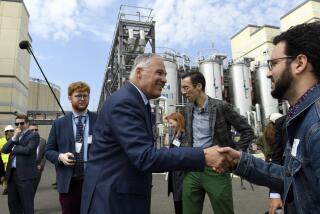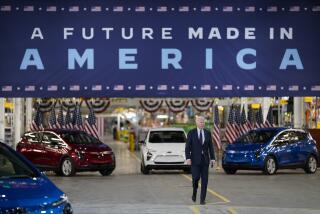State of the Union: What Obama didn’t say about energy, environment
WASHINGTON -- President Obama’s discussion of energy and environmental issues in his State of the Union address was notable not just for what he said, but for what he didn’t say.
The president largely stuck to issues he had discussed before, such as how a good portion of the country’s economic recovery, including the limited revival of manufacturing jobs, stems from the domestic fossil fuel boom, especially in natural gas.
But he remained silent about whether or not to issue a permit for the Keystone XL pipeline, which would send oil from the tar sands of Canada to Gulf Coast refineries. It is among the most contentious questions his administration must settle.
Instead, Obama pointed out the work his administration had done on climate change, such as improving vehicle fuel economy and proposing limits to greenhouse gas emissions from new power plants.
“The shift to a cleaner energy economy won’t happen overnight, and it will require tough choices along the way,” Obama said. “But the debate is settled. Climate change is a fact.”
LIVE BLOG: State of the Union 2014
Given that the debate is not settled for some members of Congress, many environmentalists praised the president for his blunt comments on climate change and the steps he had taken to address it.
“President Obama has already taken steps to cut carbon pollution with cleaner car standards for motor vehicles, and investments in clean energy and energy efficiency,” said a statement from a coalition of liberal and environmental groups including the Center for American Progress, Earthjustice, the Environmental Defense Fund, Environment America, the League of Conservation Voters, and the Natural Resources Defense Council. “Now the administration will focus on dirty power plants – the largest U.S. source of carbon pollution.”
The fossil fuel industry and its allies argued that Obama’s plans to address climate change would derail the economy and further expand the federal government.
“Through this plan, he will aim to curb greenhouse gas emissions at the cost of economic growth and job creation,” said Sen. James M. Inhofe (R-Okla.).
Obama’s embrace of an “all of the above” energy strategy had its usual effect: It didn’t make any of the energy players happy. Environmentalists lamented that he did not push harder to roll back use of fossil fuels. And the oil industry expressed annoyance that he seemed to favor solar and other energy sources.
American Petroleum Institute Chief Executive Jack Gerard said he was pleased to hear the president express support for natural gas and continued hydraulic fracturing, known as fracking, but warned that increased federal regulations would cost jobs.
State of the Union: 15 historic moments
“The worst thing right now would be to impose additional regulations,” Gerard said. “The governors in states who already regulate this say, ‘Don’t come in here, stay out of our way, and we will continue to regulate ourselves.’”
Gerard also took a swipe at the Obama’s vow to streamline approval of major infrastructure projects.
“We would suggest the first project he could act on is Keystone, which is the largest infrastructure project in the country. It is now in its fifth year of waiting,” Gerard said.
Gerard was also not pleased by the president’s call on Congress to end $4 billion in tax breaks received by fossil fuel industries.
“It is a gratuitous slap at the industry because he thinks it resonates with some constituency,” Gerard said. “He has bipartisan opposition to that approach. It is a nonstarter. There is no reason for it, though he continues to do it.”
Follow Politics Now on Twitter and Facebook
Twitter: @evanhalper
Twitter: @neelaeast
More to Read
Sign up for Essential California
The most important California stories and recommendations in your inbox every morning.
You may occasionally receive promotional content from the Los Angeles Times.











